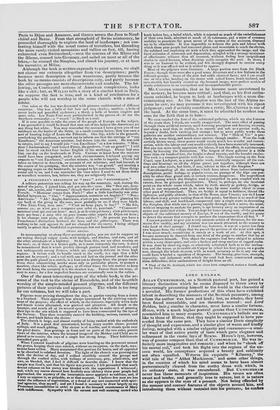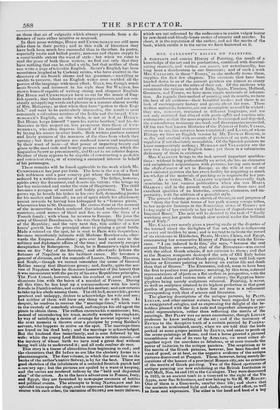LORD ROLDAN.
ALLAN CUNNINGHAM, as a Scottish pastoral poet, has gained a literary distinction which he seems disposed to throw away by perseveringly presenting himself to the world in the character of a novelist. His former productions of this class have exhibited talent in describing the manners of the Scottish peasantry, among whom the author was born and bred ; but, as wholes, they have been found unreadable, and are therefore unread : and Lord Roldan, being similar in character, must have a similar fortune. Hocu, with a much higher poetical genius than CUNNINGHAM, resembled him in many respects. CUNNINGHAM'S ballads are so like to those of Houu, that they might be supposed to have pro- ceeded from the same pen. They have a similar Doric simplicity of thought and expression, and a similar glow of warm and kindly feeling, mingled with a similar vulgarity and coarseness—a simi- lar want of that native purity of taste which gave elegance and refinement to the rustic lays of BURNS. HOGG'S lyre, however, was of greater compass than that of CUNNINGHAM. He was in- finitely more imaginative and romantic ; and when lie "shook off his mortal coil," and took his flight into the regions of the un- seen world, his conceptions acquired a beauty and sublimity not often equalled. Witness his exquisite " Kilmeny," the wild tale of the " Abbot Mackinnon." and some other things, in the creation of which his mind seems to have been almost preternaturally cleared from the earthy dross with which, in its ordinary state, it was encumbered. But CUNNINGHAM never has these moments of inspiration. His verses are often sweet and tender, and generally true to nature, but it is nature as she appears in the eyes of a peasant. Not being offended by the meaner and coarser features of the objects around him, and introducing them without restraint into his pictures, be confers on them that air of vulgarity which always proceeds from a de- ficiency of taste either intuitive or acquired.
In their prose writings, Ilona and CUNNINGHAM are still more alike than in their poetry; and in this walk of literature they have both been much less successful than in theother. In poetry, especially rustic und ballad poetry, measure and rhyme supply to a considerable extent the want of style : but when we come to read the prose of both these writers, we find not only that they have nothing that can be called a style, but that neither of them can write a page of tolerable English. SCOTT'S English has been sometimes laughed at by Cockney critics, who have exulted in the discovery of his Scotch idioms and lax grarnmar,—unwilling or unable to perceive, that no English writer ever wielded all the powers of the language with more effect. GALT, too, though much more Stretch and incorrect in his style than Sir WALTER, has shown himself capable of writing strong and eloquent English. But HOGG and CUNNINGHAM have no ear for the music of Eng- lish speech ; they labour under a sad inopia verborum. and are con- stantly misapplying words and phrases in a mariner almost worthy of Mrs. Malaprop ; so that when they have " gotten to their Eng- iish," and want to be particularly impressive, the result is most commonly a ridiculous mixture of the feeble and the turgid. CUN- NINGHAM'S EligtISII, on the whole, is not SO bid as linen's. But Hone; keeps himself " upon his native heather," and his de- ficiencies in this respect are less prominent than those of CUN- NINGHAM, who often deprives himself of his national resources by laying his scenes in other lands. Both writers produce natural and lively pictures of the manners of the class from which they sprung ; but their pictures are rendered coarse and unpleasing by their want of tasfe—of that power of imparting beauty and grace to the most rude and homely persona and scenes, which dis- tinguishes Smarr so preeminently, and GALT in an inferior degree. Neither of them appears to be capable of constructing a probable and consistent story, or of creating a sustained interest in behalf of his personages.
These remarks will be found applicable to the work which Mr. 'CUNNINGHAM has just put forth. The hero is the son of a Scot- tish nobleman and a poor country girl whom the nobleman had seduced by a written promise of marriage. The father, however, _spirits away the document, and deserts his victim; who brings up her boy unassisted and under the stain of illegitimacy. The child becomes a paragon of mental and bodily perfection. When be grows up, he beards his father in his own hall, demanding justice for his mother and himself; an act of spirit which hie affectionate parent rewards by having him kidnapped by a "famous pirate," who carries him to St. Domingo. He arrives there at the moment of the insurrection which rendered that island independent ; and contrives, amid scenes of blood and tire, to save the lives of a French family; with whom he returns to Europe. He joins the army of General Beauharnois, who was then fighting the enemies of the Republic ; and the very next day, this soldier of' a few hours' growth has the principal share in gaining a great battle. Made a colonel on the spot, he is sent to Paris with despatches; becomes immediately intimate with Madame Beauharnois, after- wards the Empress Josephine; gets over head and ears in the military and diplomatic affairs of the time ; and narrowly escapes decapitation by Robespierre. Next, he is Bonaparte's right hand Than on the "day of the Sections," and afterwards follows the fortunes of Napoleon in his brilliant career. Ile becomes a general of division, and the comrade of Lasnes, Desaix, Massena, and Soult,—though we cannot remember the name of General Bolden among that illustrious group; and, finally, quits the ser- vice of Napoleon when he discovers (somewhat of the latest) that it was inconsistent with the putity of his own Republican principles. The First Consul, however, takes his conduct in good part, and -dismisses him with the baton of a marshal of France. During all this time, he has kept up a correspondence with his lowly friends in Dumfriesshire, and enriched his mother; and now returns to take up his abode among them. The old bid, meanwhile, grown penitent and unhappy, desires to acknowledge his wife and soil; but neither of them will have any thing to do with him. In despair, he resolves to recover the "marriage-lines," which were in the custody of somebody abroad, and employs his old agent the pirate to obtain them. The ruffian executes his commission; but, instead of surrendering his trust, mortally wounds his employer, by way of satisfying a desire of revenge for ancient injuries ; and the next moment is thrown over a precipice by young Roldan's servant, who happens to arrive on the spot. The marriage-lines are found on his dead body ; and the marriage is acknowledged. But the husband dies immediately, and is soon followed by the wife; while the young Lord Roldan marries a certain cousin,—of the mystery of whose birth we have read a great deal without being well able to understand it; and all ends couleur de rose.
This story is a tissue of absurdities from beginning to end ; and the characters that flit before us are like the shadowy forms in a phantasmagoria. The first volume, in which the scene lies on the banks of the author's native Solway, is by far the best. There are good sketches of the inhabitants of a secluded Scottish parish half a century ago ; but the pictures are spoiled by a want of keeping, and the scenes are rendered tedious by the "bald and disjointed chat" of the actors. As to the hero's adventures in France, Italy, and Egypt, they are furnished by newspaper accounts of battles and political events. The attempts to bring NAPOLEON and his splendid train upon the stage,and to represent their familiar inter- course with each other, (in imitation of Scorr,) are mere failures, which are not redeemed by the endeavours to excite vulgar horror by raw-head-and-bloody-bones scenes of atrocity and murder. In short, it is the reputation of the author, and not the merits of the book, which entitle it to the notice we have bestowed on it.



























 Previous page
Previous page